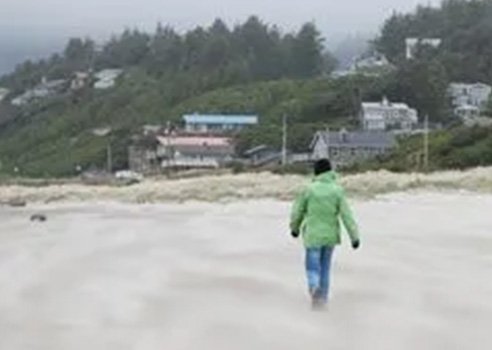Word count: 721 words
Reading time: Less than 3 minutes
Do you allow yourself to get tied up in your own writing problems? Here are five strategies to try the next time you get stuck.
My husband and I were in Oregon last week and spent several days on the Coast, home to some of the best beaches in the world.
It wasn’t sunny. It was wet and cold. And incredibly windy. As we walked, with the wind behind our backs (no way did we have the strength to head in the other direction) I could hear the rapid snap-snap-snap as the wind caught the sleeves of my green Gore-tex jacket. I felt if I were perhaps 10 pounds lighter the wind might have picked me up. (Or that might just have been me, fantasizing.)
Then, I looked down and saw cubic yards of sand being swept along behind us. The sand looked like cirrus clouds, only chasing our feet instead of up in the sky. It was incredibly impressive and I asked my husband, an excellent photographer, to take a shot. “I don’t know how,” he had to shout so I could hear him above the wind.
I could see it would be tricky. You have to know exactly how to set your shutter speed and aperture – and where to focus – in order to best capture the whirling sand. What’s more, standing in a storm with expensive camera lenses in hand is no time to figure that out!
Funnily enough, I’ve seen a similar issue face down writers. They don’t know how to do something and they stop writing. They get frustrated and they stare off into space. Sometimes they even give up completely. Here are five suggestions for what to do if you get similarly stumped.
1) Google your problem. Don’t just say, “I don’t know what to write next” but articulate exactly what’s hampering you. Do you not know how to begin a story? Are you having difficulty working in enough good quotations? Or, maybe you are trying to make dull, technical information more interesting? Once you have the words for your problem then do a Google search. Google is the first trick you should almost always use to solve your writing problems. There’s a ton of free information on the Internet; allow it to help you!
2) See how others have solved similar problems. Read other writing – choose material that’s similar to what you want to accomplish – and figure out how that writer solved your problem. It might help you to copy that person’s writing. I don’t mean you should pass off the writing as your own. The purpose of copying the work of another author is simply to help you absorb that writer’s voice and style. Do it for 10 minutes, copying word for word, and then start writing on your own.
3) Find a book that can help you. There are several zillion books on writing out there. I’ve written 8½ steps to writing better, faster, but there are many other titles as well. Choose one that suits your needs.
4) Talk to a friend. This friend needn’t be a writer. Sometimes all we need is a good listener who can be patient — and quiet — while we talk through our conundrums. We know the answer, ourselves, of course. But sometimes we need to speak out loud to figure it out.
5) Consult an expert. If you’re being paid for your writing, or if your problem is big enough, then you should consider getting professional advice. Look for someone who specializes in your problem. I like working with writers who suffer from any form of writer’s block or who need to write faster. You can take an online course with me, or work with me one-on-one.
But did you notice that all five steps I suggest require you to identify your own problem first? This will save you time, frustration and money. In fact, you may be able to fix your writing problem without spending a cent.
By the way, I’ve tried Googling “photographing swirling sand” for my husband and had no luck. We’ll look at some books next, but I suspect that he’ll need to talk to an expert, whether informally, or perhaps through a course.
Addressing issues like this as one-time specific problems is far more useful than “awfulizing” and assuming you simply can’t do something. Of course you can! You just need the right information, first.
How do you solve your writing problems? We can all learn from each other so please share your thoughts with my readers and me by commenting below. (If you don’t see the comments box, click here and then scroll to the end.)


